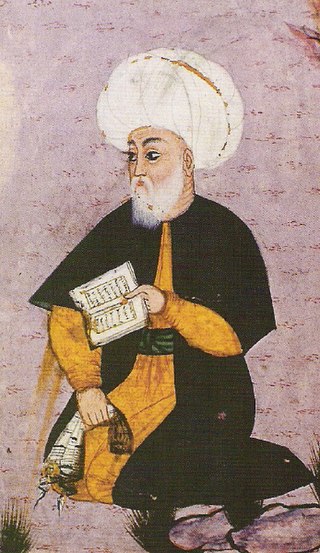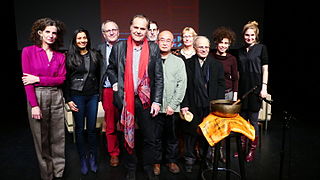Related Research Articles

Kirkuk is a city in Iraq, serving as the capital of the Kirkuk Governorate, located 238 kilometres north of Baghdad. The city is home to a diverse population of Kurds, Iraqi Turkmens and Arabs. Kirkuk sits on the ruins of the original Kirkuk Citadel which sits near the Khasa River.

Muhammad bin Suleyman, better known by his pen name Fuzuli, was a 16th-century poet who composed works in his native Azerbaijani, as well as Persian and Arabic. He is regarded as one of the greatest poets of Turkic literature and a prominent figure in both Azerbaijani and Ottoman literature. Fuzuli's work was widely known and admired throughout the Turkic cultural landscape from the 16th to the 19th centuries, with his fame reaching as far as Central Asia and India.

Sheikh Riza Talabani was a celebrated Kurdish poet from Kirkuk, Iraq. Talabani wrote his poetry in Kurdish, Persian, and Arabic. Most of his poetry consists of Satire, Ribaldry, Flyting and creative insults.
Mahmud ibn Ali ibn Naziri known by his pen name Hijri and his title Dede/Dade was an Iraqi Turkmen poet and writer.
Born in Kirkuk and grew up into a Kakaie family and taught by them. He started working as teacher in his hometown and in Baghdad. In 1927, he was assigned to manage Jaridat al Karkuk, after which he was appointed health inspector in the municipality department in 1928.
He died in his hometown. He wrote primarily in Turkish, but also wrote in Persian and Kurdish. He has worked in translation and history writing as well. The poet was usually quite secretive about his religious beliefs and practices: when asked by outsiders, he would often claim to be Orthodox Sunni or, sometimes, Twelver Shi'a. According to some sources, Hijri Dede died in 1952.

Tawfeq Mahmoud Hamza or Piramerd was a Kurdish poet, writer, novelist and journalist. He was born in the Goija neighborhood of Sulaymaniyah, Kurdistan Region. In 1926, he became the editor of the Kurdish newspaper Jîyan. He also established a private Kurdish school in Kurdistan, called Pertûkxaney Zanistî.

Kajal Ahmad is a contemporary Kurdish poet and journalist, known for the show Dijebaw on Kurdsat. She started writing poetry in 1987.

Fadhil Al Azzawi is an Iraqi writer highly respected in the Arab world, as he has published ten volumes of poetry, six novels, three books of criticism and memoir, and several translations of German literary works. He participated in Iraq's avant-garde Sixties Generation, and his early controversial work was lauded with great enthusiasm.

Badr Shakir al-Sayyab was an Iraqi poet who is considered one of the most influential Arab poets of all time. His works have been translated into more than 10 languages including English, Persian, Somali and Urdu.
Mulla Abu Bakr Effendi, also Mulla Effendi, also Abu Bakr IV or Küçük Mulla was a senior Islamic philosopher, scholar, astronomer, politician, and a prominent personality from Arbil, Iraq.
Ayatollah Sayyid Murtadha al-Musawi al-Qazwini is an Iraqi senior Shia jurist, poet and orator of Iranian descent.

Jamil Sidqi al-Zahawi was a prominent Iraqi poet and philosopher. He is regarded as one of the greatest contemporary poets of the Arab world and was known for his defence of women's rights.

Mala Abdul Karim Mudarris or Maulana Sheikh Abdul Karim Mudarris, also known as Nami, was a Kurdish Faqih, Mufti of Iraq, and Quran interpreter in addition to being a poet, writer, as well as a translator. He was known by the epithet Mudarris because he taught Islamic sciences for more than 80 years. Al-Mudarris left a legacy of approximately 150 publications on a multitude of subjects The majority of this work got published. His book, "Two Sentences", which was published in 1982, is a dictionary which defines Arabic words in poems in Kurdish. He was the first person to translate the Quran into Kurdish. The Kurdistan governmental region has decided to open a place for his works.

Ma'ruf bin Abdul Ghani al Rusafi was a poet, educationist and literary scholar from Iraq. He is considered by many as a controversial figure in modern Iraqi literature due to his advocacy of freedom and opposition to imperialism and is known as a poet of freedom.

Jan Dost,, is a Syrian Kurdish poet, writer and translator. He has written several novels both in his native Kurmanji Kurdish language and in Arabic. He is known as a prolific Kurdish writer, with several of his novels in the context of the Syrian civil war. Apart from his own works, Dost has translated Kurdish and Persian works into Arabic, including Mem and Zin, a classical Kurdish love story, written by Ahmad Khani in the 17th century and considered as the national epic of the Kurdish people.
Hidir Lutfi was an Iraqi poet. Born in Kirkuk in a Konyan Turkish family, he studied Arabic, Persian and Turkish. He has an unprinted Diwan of poetry, many literary researches, and a book in the history of Kirkuk. He died in his hometown and was buried there.
Amira Nur al-Din Daoud was an Iraqi poet. Born in Baghdad. After completing her secondary education, she joined Fuad I University in Cairo in 1943, and BA in Arabic Language and Literature in 1947, and a master's degree from the same university in 1957. She worked as a teacher of Arabic in secondary schools, then at the Faculty of Arts of Baghdad, then dean of the Institute of Applied Arts. Published her poetry in many Iraqi and Arab magazines and newspapers.
Sayyid Saleh Mahdi al-Badri was an Iraqi poet. He was born in the city of Samarra, then part of the Ottoman Empire, where he was educated and then at Al-Rashdiya School in Baghdad. He worked as an employee in real estate departments in numbers of Iraqi cities. He was fluent in Turkish, translated into Arabic and had knowledge of French and Persian. He won local awards for Iraqi poetry competitions. His complete poetry collection collected by his son and called it Wishes. Al-Badri died in Baghdad.

Ayatollah al-Shaheed Sayyid Abū al-Fatḥ ʿIzz ad-Dīn Naṣrallāh ِal-Fāʾizī al-Mūsawī al-Ḥāʾirī, also known as Sayyid Nasrallah al-Haeri, was a senior Iraqi Shia jurist, teacher, poet, author and annalist.

Sayyid Muhammad bin Fadlallah al-Sarawi, honorifically titled as Thiqat al-Islam, also known as Muhammad Thiqat al-Islam was an Iranian-Iraqi Ja'fari jurist, writer and poet. He has been renowned at the end of the Qajar era, i.e. the early twentieth century, as a bilingual poet in Persian and Arabic. He was born in Pahneh Kola, a village of Sari to a Tabari Musawi family. He first started his religious educations with his father then moved to Ottoman Iraq and studied from ulema of Najaf and Samarra, such as Mirza Shirazi. His efforts to promote da'wah in Iran failed. As a Twelver Shia mujtahid, he settled in Najaf from 1901 until his death, left behind two poetry collections and many books on fiqh, most of them are manuscript.
Ahmad bin Muhammad al-Muhsini was an Eastern Arabian-Iranian Ja'fari jurist and writer. He was born in Medina during his father's travels and grew up in Al-Ahsa, Eastern Arabia. He went to Iraq to complete his religious education and studied with Ja'far Kashif al-Ghita', Muhammad Husayn al-Araji al-Kazemi, M.M Bahr al-Ulum and the others. Then he settled with his family in Dowraq as a Shaykhi mujtahid, where he worked as a religious and spiritual leader for the Twelver Shiites in the region of Arabistan in the early years of Qajar Iran, from 1799 until his death during 1830s plague epidemic. Al-Muhsini left behind many handwritten books, booklets, epistles and poetry.
References
- ↑ Mir Basri. Aʻlām al-Turkumān wa al-adab al-Turkī fī al-ʻIrāq al-ḥadīth (in Arabic) (1st ed.). London, United Kingdom: Dār al-Warrāq lil-Nashr. pp. 45–48. ISBN 9781900700054.
- ↑ Kamil Salman al-Jabbouri (2002). Muʻjam al-shuʻarāʼ : min al-ʻAṣr al-Jāhilī ḥattá sanat 2002 M. Vol. 5th (1st ed.). Beirut, Lebanon: Dār al-Kutub al-ʻIlmīyah. p. 350. ISBN 9782745136930.